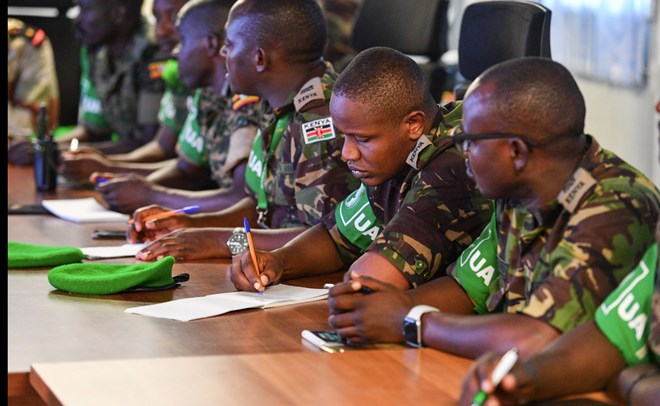Military engineers serving in Somalia as part of the African Union Mission in Somalia (AMISOM) have completed a four-day training to combat the growing threat posed by improvised explosive devices (IEDs), which have become a favorite weapon of terrorists.
Twenty military engineers from various AMISOM outposts and some staff officers with roles related to countering the threat posed by IEDs attended the training, which began on Tuesday and ended on Friday in Mogadishu.
“Only by increasing our awareness, participation, and understanding of the IED threat will we be able to mitigate the enemy’s tactics, techniques, and procedures in order to better protect our soldiers and ultimately defeat the enemy,” said Colonel Saheed Sadiq, AMISOM Chief Force Engineer.
Engineer Sadiq explained that the changing nature of the enemy’s tactics necessitates a constant re-evaluation of personnel skills in countering IEDs and updating them on new network trends in order for them to operate efficiently and meet the mission mandate.
The training, which was organized by the AMISOM Training Cell and the United Kingdom Mission Support Team (UKMST), aimed to improve participants’ ability to identify and dispose of already deployed IEDs, as well as mitigate the threat in a timely manner.
Lieutenant Colonel Torcail Stroud-Caules, the UKMST’s Commanding Officer, emphasized the importance of participants understanding the entire IED cycle in order to identify ways to counter the threat at any level.
“The people who make IEDs will adapt their tactics, techniques, and procedures to the area in which they live and work; your job is to counter that.” It’s critical that you understand how IEDs work, how they’re constructed, the sources that make up an IED’s ingredients, and how to deal with them. You’ll need to know how to deal with it on the ground as well. “Your job is to make it safe for people on the ground to understand what they’re up against, how to mitigate threats, and make sure they’re not,” Lt. Col. Stroud-Caules explained.
Lieutenant Colonel Stroud-Caules urged participants to make sure that every member of the counter-IED network is aware of their specific role while out in the field in order to reduce casualties from IED attacks.
The officers said the training was eye-opening and that they would tell their colleagues about it.
“We learned about terrorist tactics that can be used against our ground troops.” Lieutenant Arafat Omar Ahmed, a military engineer with Djiboutian forces serving in AMISOM, said, “We are going to use this information to protect lives and properties in our areas of operations.”
“The majority of our casualties have been caused by the placement of IEDs, so the training was beneficial,” said Captain Patrick Kinyua, a Kenyan infantry officer in AMISOM.

